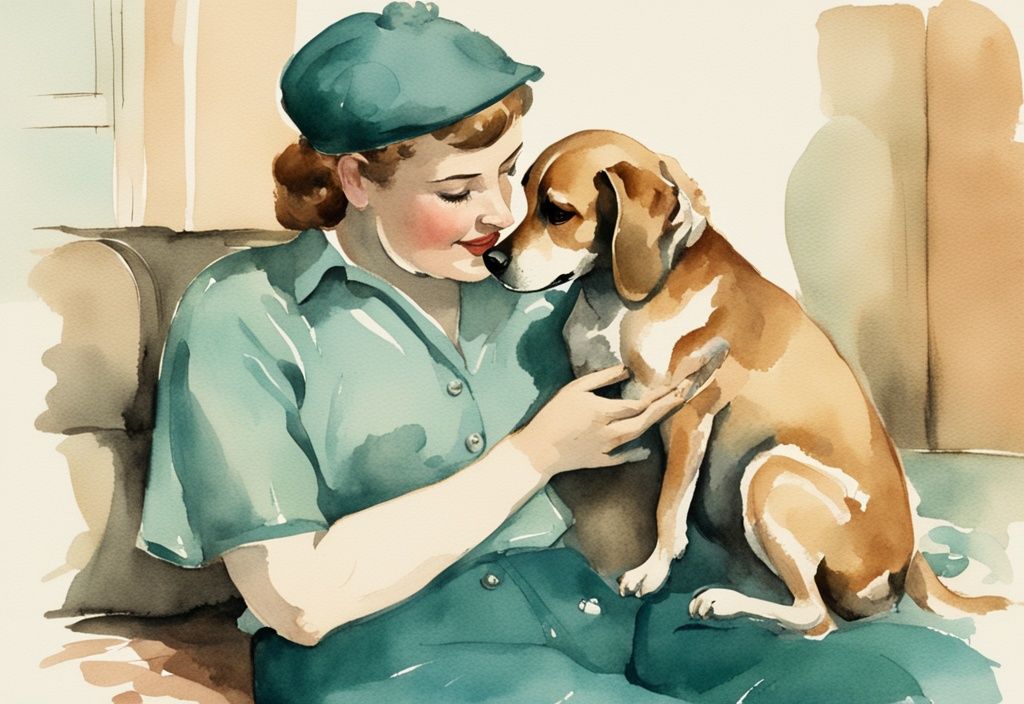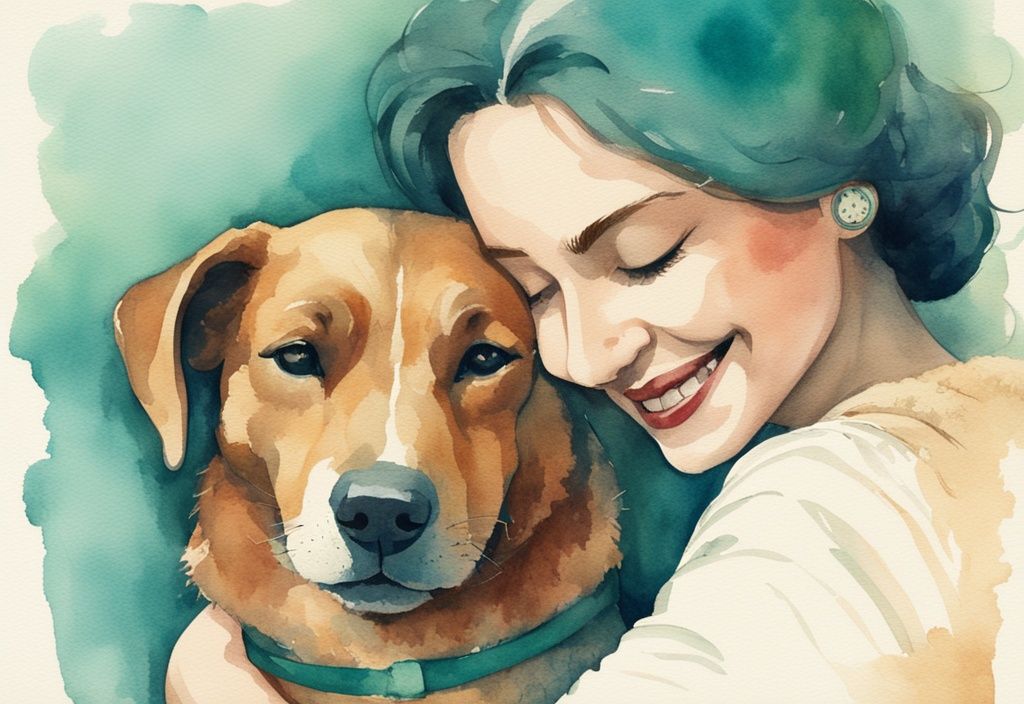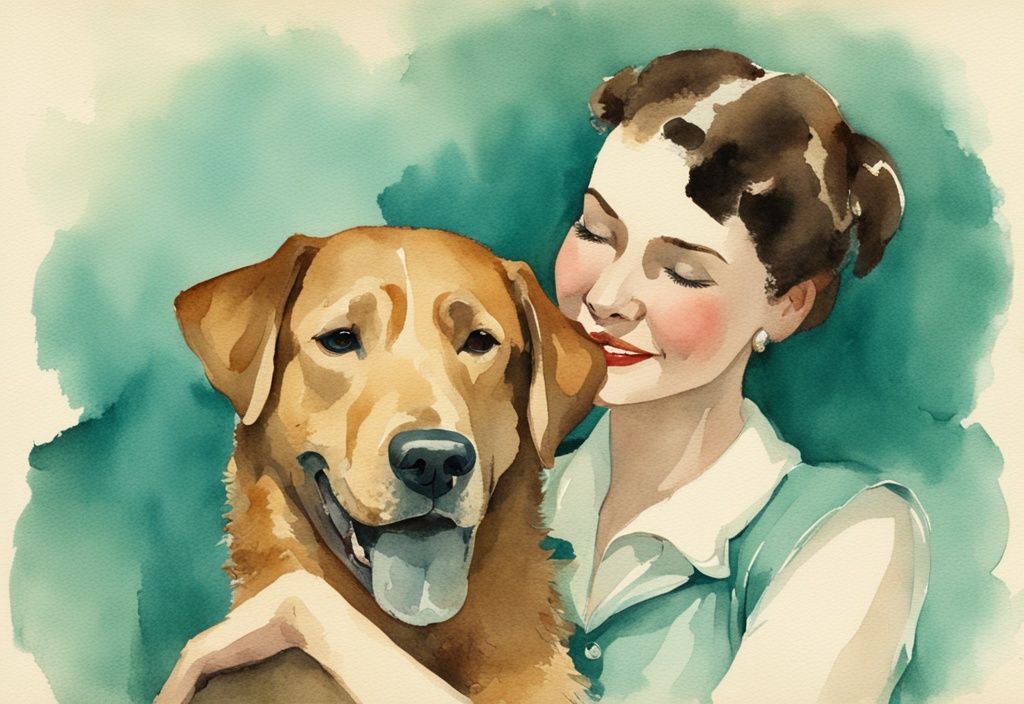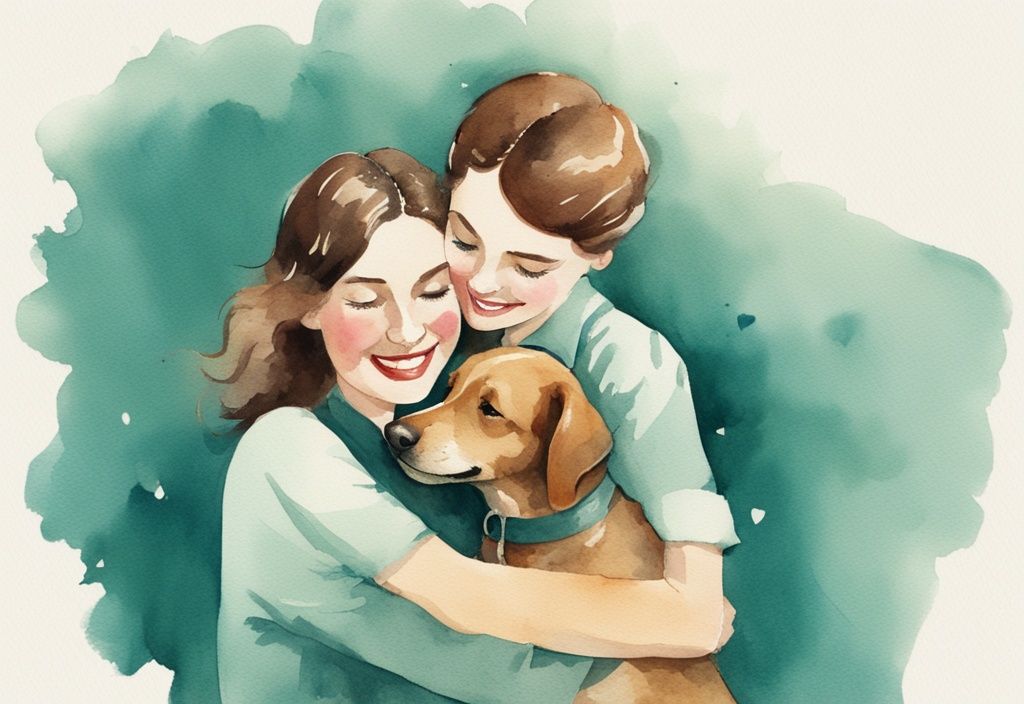“Why do I love my dog so much?” I’ve often asked myself this question when feeling that profound happiness my dog brings into my life. It’s an unbreakable bond far beyond companionship and loyalty. Is it just the tail wags and friendly licks, or is it something much deeper?
This article unravels the reasons behind our unwavering love for our dogs. Expect to dive into the fascinating world of historical, psychological, and biological insights that forge our extraordinary connection with these cherished family fur members.
So, come along on this joyful journey as we discover why our affection for our canine friends transcends just a pet and owner relationship, evolving into an irreplaceable, vital part of our lives.
The Unique Relationship Between Humans and Dogs
The bond shared between humans and dogs is a captivating journey through thousands of years, tracing back to their domestication between 20,000 to 40,000 years ago. Early humans quickly realized the countless benefits of having these four-legged companions present. Our ancestors found protection and a budding foundation for an enduring bond with dogs. Imagine the powerful survival team they formed together!
Historical and Evolutionary Background
Our mutual benefits have always tailored this remarkable relationship. Early humans not only looked at dogs as invaluable hunting partners, boosting their sense and physical abilities, but they also provided dogs with food, shelter, and a pack structure that echoed their wild instincts. This synergy wasn’t a mere chance–it was evolution in motion. It’s fascinating how our survival instincts have primed us to bond closely with dogs, integrating them as pivotal members of our social constructs.
Konrad Lorenz’s profound studies on imprinting emphasize how early life attachments carve the pathways for deeply bonded relationships. His work illuminates why, even today, the connections formed between humans and dogs are incredibly profound. This perspective not only answers the question why do I love my dog so much—it also underscores a connection that has been evolving for millennia.
Loyalty and Companionship: Why We Love Our Dogs
Dogs are synonymous with loyalty and companionship, aren’t they? They steadfastly stick by their human families, offering unwavering support through the roller-coaster of life. Whether it’s their uncontainable excitement when you walk through the door or their comforting presence during those tough days, dogs have an uncanny ability to make you feel valued. It’s these moments that clench our hearts and make us realize their genuine loyalty.
What truly endears dogs to us is their joyful disposition and unconditional love, devoid of any societal judgments. They create a pure and lasting emotional connection, one that is difficult to replicate. This loyalty and companionship shine a light on why do I love my dog so much. They extend beyond mere protection or assistance; they weave a heartfelt bond that profoundly enriches our lives.
Psychological and Emotional Reasons for Loving Our Dogs
Understanding why we love our dogs so much involves exploring the psychological and emotional benefits they bring into our lives. From reducing loneliness to providing unwavering emotional support, our furry companions truly make our lives better in countless ways.
Reducing Loneliness and Elevating Mood
One of the profound reasons why I love my dog so much is their remarkable ability to alleviate loneliness. Interacting with dogs can significantly reduce feelings of isolation. According to a national survey, 85% of pet owners reported feeling less lonely thanks to their furry companions. This relationship is more than just emotional; it is also chemical. Dogs can elevate serotonin and dopamine levels in our brains, resulting in improved mood and reduced anxiety.
The simple act of petting a dog for just ten minutes can lower heart rate, blood pressure, and muscle tension, offering significant stress relief. These physiological benefits translate into a more relaxed and happier state of mind. Moreover, owning a dog instills a sense of purpose and encourages engagement in activities like walking and playing, driving owners out of isolation and into a more active and fulfilling life.
Dog’s Support for Emotional Well-being
The emotional support provided by dogs is undeniable and contributes to why we adore them so deeply. Their behaviors and mere presence can help combat stress and depression, making life’s challenges more manageable. The non-verbal and helpless nature of dogs triggers our primal nurturing instincts, fostering a deep emotional bond that is both comforting and enriching.

Dogs offer unconditional joy and loyalty, which makes us feel deeply valued and appreciated. This bond goes beyond the physical interactions, providing a source of emotional stability and psychological well-being. Their constant companionship ensures that we never feel alone, and their joyous nature brings smiles to our faces even in the toughest of times. These attributes collectively support our emotional well-being and highlight why our love for dogs runs so deep.
Biological Influences on Why Do I Love My Dog So Much
Our deep affection for our dogs isn’t just in our heads—it’s a genuinely biological phenomenon. Here’s a closer look at the science behind it.
How Oxytocin Influences the Human-Dog Bond
The innate bond between humans and dogs is intricately tied to biological processes, particularly the release of oxytocin. Often dubbed the “love hormone,” oxytocin plays a pivotal role in fostering strong connections. When we interact with our dogs through petting, cuddling, or simply spending time together, oxytocin levels rise in both species. This mutual hormonal release creates feelings of happiness and strong affection.
Furthermore, this bond mirrors the neurological patterns observed in mother-child relationships, making the connection with our dogs feel deeply familial. These emotional connections are not just psychological but are rooted in tangible biological reactions, enhancing our understanding of why we love our dogs so much.
The Role of Dogs in Elevating Serotonin and Dopamine
Spending time with our furry companions can lead to a surge in serotonin levels, a neurotransmitter known to improve mood and reduce anxiety. Engaging in activities such as playing fetch, going for walks, or simply sharing quiet moments can elevate these levels, helping us feel more joyful and at ease.
Additionally, positive interactions with our dogs trigger an increase in dopamine, a hormone associated with pleasure and reward. This release not only reinforces the enjoyable aspects of spending time with our dogs but also strengthens the bond we share with them. These biological responses create a feedback loop that makes owning a dog incredibly fulfilling and underscores the biological influences behind why we love our dogs so much.
Dogs’ Behavioral Traits We Absolutely Adore
Understanding Dog’s Expressive Features
One reason why do I love my dog so much is their incredibly expressive features. Dogs have evolved with big eyes and movable eyebrows, traits often referred to as “infant schema.” These physical characteristics naturally trigger caregiving instincts in humans, making dogs appear more endearing and appealing to us. Their ability to make direct eye contact is another unique feature that enhances our emotional connection. Dogs often seek out our gaze for guidance and reassurance, which strengthens the bond and deepens the connection between humans and their canine companions.
Imagine those big, soulful eyes looking up at you, silently asking for a treat or just some extra love. Dogs’ faces are so animated—they can convey a whole range of emotions with just a tilt of the head or a wag of the tail. This expressiveness makes them not only incredibly cute but also profoundly communicative. It’s no wonder why people feel such a strong urge to protect and cherish their furry friends.
Why Dogs Understand Human Emotions
Another reason why do I love my dog so much is their remarkable ability to understand human emotions. Dogs are adept at reading our emotional states through our body language and tone of voice. This extraordinary capability enables them to respond empathetically, providing comfort and support when we need it the most. Their sensitivity to our feelings fosters a profound bond of communication and mutual respect. Whether we’re experiencing joy, sadness, or stress, dogs consistently offer their unwavering, empathetic presence, which greatly enhances our psychological well-being and solidifies our emotional connection with them.
Think of those moments when life feels overwhelming, and suddenly, your dog is right there, nuzzling your hand or resting their head on your lap. Dogs seem to have an almost magical ability to sense when we’re upset. That gentle nudge or warm snuggle isn’t just comforting; it’s a reminder of the unconditional love and understanding that our canine companions offer.
Even in moments of joy, dogs amplify our happiness. Their enthusiasm is contagious—just watch a dog’s sheer excitement when you pick up their leash for a walk. These shared moments create memories and deepen the emotional connection we have with them.
Therapeutic Roles of Dogs In Human Lives
Ever find yourself asking, “Why do I love my dog so much?” It’s a question that many dog owners ponder and the answer lies in the incredible therapeutic roles that dogs play in our lives.

How Dogs Help in Reducing Anxiety and Overcoming Trauma
Dogs have an almost magical ability to alleviate stress and anxiety, thanks to their calming presence and consistent companionship. Whenever I’m having a rough day, just spending a few moments with my dog can completely change my mood. It’s like they know exactly when you need a lick on the cheek or a playful nudge.
Dogs are masters at offering comfort during life’s ups and downs. Their non-judgmental nature creates a safe emotional space where we can truly be ourselves. This type of bond helps us heal and grow emotionally, making us appreciate their presence even more.
Service dogs, in particular, are trained to assist people in overcoming trauma. Their specialized training allows them to detect and respond to human emotions with remarkable precision. For veterans, abuse survivors, and those grappling with severe trauma, these devoted companions offer not just support but a renewed sense of trust and affection. They become a lifeline, guiding their handlers through the maze of daily challenges and restoring a sense of security.
Pet therapy programs are another fantastic way dogs contribute to our mental well-being. These programs have garnered attention for their effectiveness in alleviating symptoms of depression, PTSD, and other mental health conditions. Whether it’s a structured interaction like petting and walking or just the pure joy of being in the company of a dog, these experiences can lead to significant mood improvements and stress reduction.
The more I think about it, the more it becomes evident why we love our dogs so much. Their unconditional love and ability to understand and respond to our emotions forge an unbreakable bond. It’s not just that they’re pets; they’re healers, loyal companions, and cherished family members. This unique connection significantly boosts our emotional well-being, adding layers of richness and warmth to our lives.
How to Best Show Love to Your Dog
Understanding how to express your affection for your dog can truly enhance your bond. By engaging in meaningful activities and learning their love language, you’ll find countless ways to deepen the special connection you share.
Recommended Meaningful Activities with Your Dog
Engaging in cooperative games like fetch or agility training not only strengthens the bond between you and your dog but also offers physical and mental stimulation. These activities provide an outlet for their energy and reinforce your position as a trusted companion. Why do I love my dog so much? Participating in these shared experiences, watching them thrive and perform, makes every moment together feel special.
Regular walks and outdoor adventures are crucial. Exploring new parks, trails, or even simple strolls around the neighborhood can bring joy to both you and your dog. It’s a chance for them to experience new scents, sights, and sounds, keeping their senses sharp and their mind active.
Plus, these moments offer a chance for quiet contemplation and companionship, reinforcing why we cherish our pets so deeply.
Low-stress grooming sessions are another excellent way to show love. Grooming isn’t just about keeping your dog clean; it’s an opportunity to make them feel secure and cared for. Gentle brushing, nail trimming, and ear cleaning can build trust and comfort.
These moments of intimate care can enhance the bond, answering the question of why do I love my dog so much through tangible acts of affection and attention.
Understanding Your Dog’s Love Language
Each dog has a unique way of expressing and receiving love. Observing your dog’s preferences helps in understanding their “love language.” For some, it might be playtime with their favorite toy, while others might prefer treats or physical affection. Recognizing these cues is key to deepening your relationship.
Spending quality one-on-one time with your dog is crucial. Whether it’s through play, a quiet walk, or simply lounging together, these moments signal to your dog that they are valued and loved.

This individualized attention helps strengthen the bond and underscores why we adore them so much.
Consistent and positive training is another way to show love. It’s not just about teaching commands but also about reinforcing trust and mutual respect. Using positive reinforcement techniques ensures that training is a supportive and enjoyable experience for your dog.
This consistency and positive interaction play a vital role in forging a strong, loving bond, reiterating why we hold such affection for our loyal companions.
Conclusion: Celebrating and Understanding the Love for Our Dogs
The love we feel for our dogs is a profound emotion that stems from a deep-rooted history, biological instincts, and emotional connections. This affection has evolved over thousands of years, beginning from the time humanity first domesticated dogs to aid in protection, hunting, and companionship. This ancient alliance has laid the foundation for the enduring bond we share with our canine companions today.
Dogs offer unparalleled loyalty and companionship, standing by our side through all of life’s ups and downs. Their consistent affection and protective nature make them indispensable members of our families. This loyalty is not just about their presence but also about how they make us feel essential and valued. We often find ourselves wondering, “why do I love my dog so much?” It’s because dogs display behaviors that resonate with our need for unconditional love and acceptance, offering joy without the filters of societal judgments.
From a psychological and emotional perspective, dogs play a significant role in our well-being. They help reduce loneliness and elevate mood by increasing levels of serotonin and dopamine in our brains. These interactions are more than just emotionally satisfying; they are physically beneficial, lowering stress levels, heart rates, and blood pressure. The non-verbal communication and helpless nature of dogs tug at our primal nurturing instincts, creating a deep emotional bond that supports our psychological health.
Biologically, the bond between humans and dogs is further cemented by the release of oxytocin, known as the “love hormone,” which promotes strong attachments. The mutual increase of oxytocin in both humans and dogs during interactions essentially makes this bond comparable to that of a mother and child. Additionally, the elevation of serotonin and dopamine levels during moments of joy with our dogs underpins the answer to why we love our dogs so much; these chemical reactions reinforce our attachment and the pleasure we derive from their company.
Dogs also possess endearing behavioral traits that only deepen our affection for them. Their expressive features, like those soulful eyes and versatile eyebrows, activate our caregiving instincts. Their ability to read and respond to human emotions strengthens our empathetic connections, making us feel understood and supported.
With their therapeutic roles, dogs help reduce anxiety and aid in overcoming trauma. Whether through informal companionship or structured pet therapy programs, dogs are instrumental in fostering emotional resilience and recovery. This therapeutic bond not only improves mental health but also enhances the overall quality of life for many individuals across various walks of life.
To truly celebrate and understand the love we have for our dogs, it’s essential to engage in meaningful activities, understand their unique ways of expressing affection, and provide consistent care and training. By comprehensively appreciating this ancient, biological, and emotional bond, we can enrich the lives of our dogs and our own, fostering a connection that is truly remarkable.
FAQ
Can you love your dog too much?
Sometimes, our love for our dogs knows no bounds, and while it’s mostly a beautiful thing, it can occasionally lead to unhealthy dependency or misguided care. Spoiling them endlessly without setting proper boundaries might cause some behavioral hiccups. It’s all about balance, just like any other relationship.
How can having a dog benefit your mental health?
Dogs are like little furry therapists with wagging tails. They can brighten up your day by reducing feelings of loneliness, boosting your mood, and even lowering stress levels. Their companionship offers unmatched emotional support, making your overall well-being soar with every wag and woof.
Why do we form such strong bonds with dogs?
Our strong bonds with dogs stem from a rich blend of evolutionary history and mutual benefits. Their emotional support and our natural biological responses, like the release of oxytocin, create a deep sense of loyalty and companionship. This powerful bond fills our lives with joy and connection.
What are some ways to show my dog I love them?
Showing your dog love can be an exciting part of your daily routine. Engage in meaningful activities like playing fetch or going for a walk. Understanding their unique love language and providing consistent positive training can work wonders. Remember, keeping them mentally and physically stimulated showcases your affection in every tail-wagging moment.
I’m feeling really sad after losing my dog, is this normal?
Absolutely, it’s normal to feel profoundly sad after losing a beloved dog. They are cherished family members, and the bond you shared is irreplaceable. This emotional journey reflects the strong connection and unconditional love you had. Give yourself time, and don’t hesitate to seek support to navigate through your grief.
